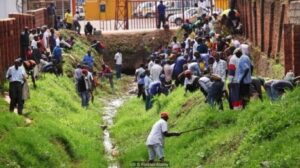
 travel
travel 
I sat on the terrace of La Brioche, a popular bakery cafe in the Gacuriro district of Kigali. It was twilight – the streetlights came on, and after a sweltering autumn day, the first hint of cold wafted through the air. As I sat down reading a collection of short stories by renowned Rwandan writer Beata Umubyeyi Mairesse with my cappuccino and demi-baguette that I had just found at the best literary bookshop in Kigali, Ikirezi Books, I noticed my phone running low. At the next table, I asked the young man, whom I would have heard speaking English earlier (most people in this trilingual city do, but it’s nice to check), if he had a charger. He hasn’t. He returned to his MacBook, I to my short story, and then he turned back to me about a minute later.
“I’m leaving for an opening near a new photo gallery in a couple of minutes,” he said. “It was supposed to be fun. You want to come here?”
I called the local ride-share service, the car on the move exclusively populated with Volkswagens assembled at a nearby new plant, and we arrived early at the Kigali Photo Center. Theo, 23, the terrace guy, seemed to know everybody and introduced me. Joseph studied film at the Film and Television School in Kigali. Rodriguez has a 103.6 HOT FM show on the local radio station. Group teaching traditional basket-weaving to under-employed women, and another offering at-risk youth space and painting supplies. Jacques is the owner of the gallery, and Winny owns Sweet Ibanga, a mixology company that works for the band. “I know what you like,” she beamed to Theo as she shared a mojito with him.
Kigali is a town with more to do recover from than almost any other city On the continent, including Somalia’s Mogadishu and South Sudan’s Juba still have to get it together. But over the past 25 years, and especially over the past decade, Kigali has been transformed into what might be the most welcoming city in Africa by President Paul Kagame, by new laws and policies, and especially by the people who live there.
And while many factors have resulted in its robust infrastructure and booming growth, one thing stands out as the concept of organization: Umuganda.
Each month’s last Sunday, from 08:00 and 11:00, in each Rwandan household, At least one person from 18 to 65 years of age must go outside and do maintenance work, cleaning, fixing, or doing. Umuganda, a word from Kinyarwanda that can be roughly translated as “community service,” is part of the heritage of Rwanda; it became an officially promoted custom as early as 1998 and a rule ten years ago. And although you can now be punished for regularly failing your umuganda duties without an excuse, it is in favor of the national practice of pitching in everybody I spoke about.

“I don’t know anything else for me,” said Igihozo, 27, Esperance. “When it started, I was a kid.”
Sitting in the Bourbon Coffee local chain (including branches in Washington, DC, and Cambridge, MA), Esperance, who operates a guest house and cultural education service to visit students and visitors, explained how – and why – it works.
“We all know what to do now,” she said. “I live in the [ neighborhood near the airport ] of Kichikuru.” We have what we call ‘ cells ‘ of 10 or so houses. Each cell has a group of WhatsApps to organize and keep in touch. They tell, ‘ You’re going to sweep, and you’re cutting the brush. ‘ Kigali is always clean now, but you’re still sweeping. Umuganda is also about socializing.
Upon my way to the airport, I should have found that Kigali was surprisingly clean. For years, plastic bags have been outlawed here (actually, I was instructed to go through my belongings and leave any plastic bags upon the plane by a government-mandated announcement on my flight). But this is the last bit, about socializing, which may have more profound effects.
It has been 26 years since the hundred days the country plunged into the twentieth century’s most brutal civil war, pitting one colonially defined group against another, leading to around 800,000 deaths. Although even casual discussion of these groups is now forbidden – Esperence told me that although I was a visitor was entirely If she was overheard of talking to other Rwandans and talking to people, free to speak and ask questions like Tutsis or Hutus, she could be arrested – this nation’s fundamental discord has been profound. Umuganda is another activity that aims to reinforce the conventional notion that no more groups exist; that everybody in Rwanda is just Rwandan.
And it works so far.

The Kigali that Desirée Isere, a guide with Go Kigali Tours, shows me is not only clean and safe (the U.S. Overseas Security Advisory Council provides Kigali with Security evaluation at level 1, the same as in Vancouver), however also genuinely friendly. The Kigali that Desirée Isere, a guide with Go Kigali Tours, shows me is not only clean and safe (the U.S. Overseas Security Advisory Council provides Kigali with A health evaluation at level 1, the same as in Vancouver), however also genuinely welcoming.
Isere tells me how she thinks a tourist can better explore her city as we walk through the four-level Kimisagara market.
“Second, you’re going to the Memorial of the Genocide,” she said as we wind our way through this market, where dried beans were used, clothes. Bananas are the primary commodities by the million. “It gives you an idea of what Kigali is all about how it turned out. That’s what it’s like and what happened here. After that, though, I should suggest go to the bars at night and eat some brochettes[ small, well-seasoned goat meat skewers]. “That’s what Kigali’s about now, she says: daily life, simple food, peaceful people, not history, not conflict, not genocide.